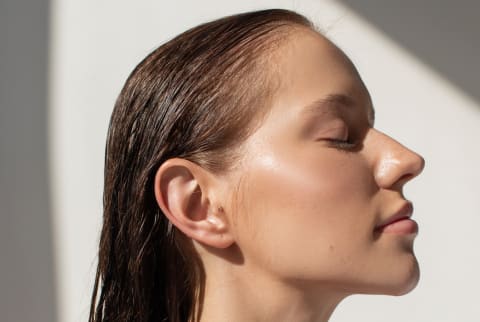Advertisement
You Might've Heard Of An Apple Cider Vinegar Rinse—Now Try A Tea Rinse


When we think of hair care, our minds usually go straight to shampoo and conditioner. For the beauty inclined, you likely have a few extra products at hand as well: oils, leave-ins, sprays, and the like.
Rinses, however, may not be part of everyone's routine. We're here to tell you: They're worth a spot in your hair care arsenal. Not only can they provide your strands with a shot of nutrients, but they are usually DIY—making them cheap and easy.
And maybe you've heard of apple cider vinegar rinses. You may have even heard of rice water rinses. Now, it may be time to try a tea rinse. Here, we explain why.
Why should you try a tea rinse?
Tea rinses come down to tea's caffeine content. See, caffeine has been shown to have hair-growth properties when used, typically, on the scalp: "Caffeine has been found to have growth-promoting effects on the hair follicle. Tea rinses can be an easy way to potentially reap these benefits," says mbg hair care source and board-certified dermatologist Raechele Cochran Gathers, M.D., in an Instagram post. In fact, she notes, there's one 2018 study that shows that a caffeine-based liquid topical treatment can be just as effective as Minoxidil1, the active treatment in brands like Rogaine and the traditional treatment for hair loss.
Not to mention, if you use something like green tea, you'll also get plenty of antioxidant benefits. Green tea is chock-full of polyphenols and flavonoids. Antioxidants can help neutralize free radical damage on the scalp and hair, which can mean better hair retention, reduced premature graying, and even more vibrant strands.
So not only are you promoting hair growth, but you are helping the hair you do have.
An easy DIY tea rinse
Tea rinses are oh-so-easy—likely easier to make than other rinses you may have tried before. Use it once a week for optimal results.
- Brew 1 to 2 cups of water with 2 to 3 green tea bags.
- Let cool to room temperature.
- Transfer into a squeeze bottle, like a repurposed shampoo bottle.
- In the shower, shampoo your hair to clean the scalp and remove buildup (this way, the caffeine can penetrate the follicle).
- If you have dry hair, use a conditioner or mask as usual; you can skip conditioner if your hair tends to be oily and flat.
- Apply your tea from scalp to tip.
- If you so choose, you can put on a shower cap and let the tea set for 20 minutes.
- Rinse your hair with the spray of the shower, but don't rinse the tea out all the way.
- Style as normal.
What rinse is right for you?
Considering there are a few rinses you can try at home, you may be wondering which one is best for your hair and hair goals. And the thing is, each ingredient has a unique strong suit. Here, which one you might want to try:
- For shiny, frizz-free strands: apple cider vinegar rinse. Apple cider vinegar rinse's acidic nature helps lower the pH of the hair after shampooing, thus closing the cuticle. When the cuticle is smoothed down, your hair appears more shiny with less frizz.
- For strengthening hair: rice water rinse. Rice water rinses are high in starch, which adds strength, enhances hydration, and minimizes the appearance of split ends.
- For growth and thickness: tea rinse. Given tea's caffeine content, it may be your best bet for long, lush hair.
The takeaway
Hair rinses are a great DIY addition to your routine, including tea rinses to help promote hair growth thanks to their caffeine content.